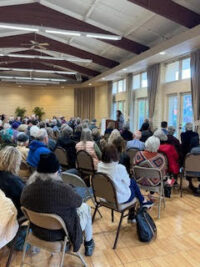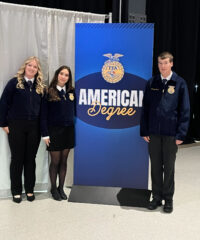Sonoma Mayor Jack Ding picks up a free kitchen compost pail and biodegradable pail liners from Jana Wang at Refill Madness, her store in the Sonoma Valley Shopping Center.
By Travis Wagner
The City of Sonoma has launched its Compost It Sonoma! program, distributing small kitchen pails for residents to collect their food scraps. The handy pails can then be emptied into the large green organics bins for free curbside collection.
Why focus on food scraps? Organic material that is landfilled converts to methane. Methane is a powerful greenhouse gas that contributes to climate change. It is 25 times more potent than carbon dioxide. In California, food scraps account for 18 percent of all the material that goes to landfills. This means on average, every year each person in Sonoma sends about 300 pounds of food scraps to the landfill.
The good news is that methane from landfills is the easiest greenhouse gas to prevent. By placing all organic materials, which includes your food scraps, into the green organics cart, you can prevent the generation of methane. In addition to food scraps, paper towels, napkins, and tissue can be composted, they also should go into your green organics cart. (Not the blue recycling bin)
But wait, there’s more! Collected organics and food scraps are brought to Napa where they are composted. This compost is then distributed throughout the area and used by farmers, vineyards, landscapers, and home gardeners.
There are many benefits of compost when it is added to soil including it increases moisture retention, improves drainage, enhances aeration, adds important nutrients, and creates healthier soil. It also sequesters carbon.
For those residing in apartments or condos, state law requires that there be green organics carts or “dumpsters” for food scraps and organics.
This climate action program is occurring throughout California as part of a recent state law, SB 1383, which mandates that all residents, businesses, and institutions separate out their organics and food scraps for special specific collection and composting. The law also is trying to prevent the creation of food waste and to capture edible food waste for local communities to reduce food insecurity.
You can help reduce the generation of food waste by buying the amount of fresh food and produce that you likely will consume (sale events can encourage you to buy more than you need), proper storage to prevent spoilage, reusing edible scraps to make stocks and soups, and be wary of “best buy” dates, which often are misleading.
If you have felt a little powerless to help fight climate change, collecting and separating your food scraps is the easiest and no cost action to make a difference.
You can pick up a free kitchen pail specifically designed for food scraps, which contains post-consumer recycled plastic, at Refill Madness (500 W. Napa St., #540), the Sonoma Garden Park (19996 7th St. E. on Fridays and Saturdays from 9am – 11am), or City Hall (the Plaza). Or customers of Sonoma Garbage Collectors can email them at CounterTopPails@gmail.com and a kitchen pail will be delivered.
You can line your pail with paper towels, paper, or cardboard. Residents of Sonoma can use certified, green compostable plastic bags, which can be purchased at Refill Madness in Sonoma. Learn more at it Sonomacity.org/sort-it-sonoma/
Travis Wagner is the Sustainability Coordinator for the City of Sonoma








Be First to Comment